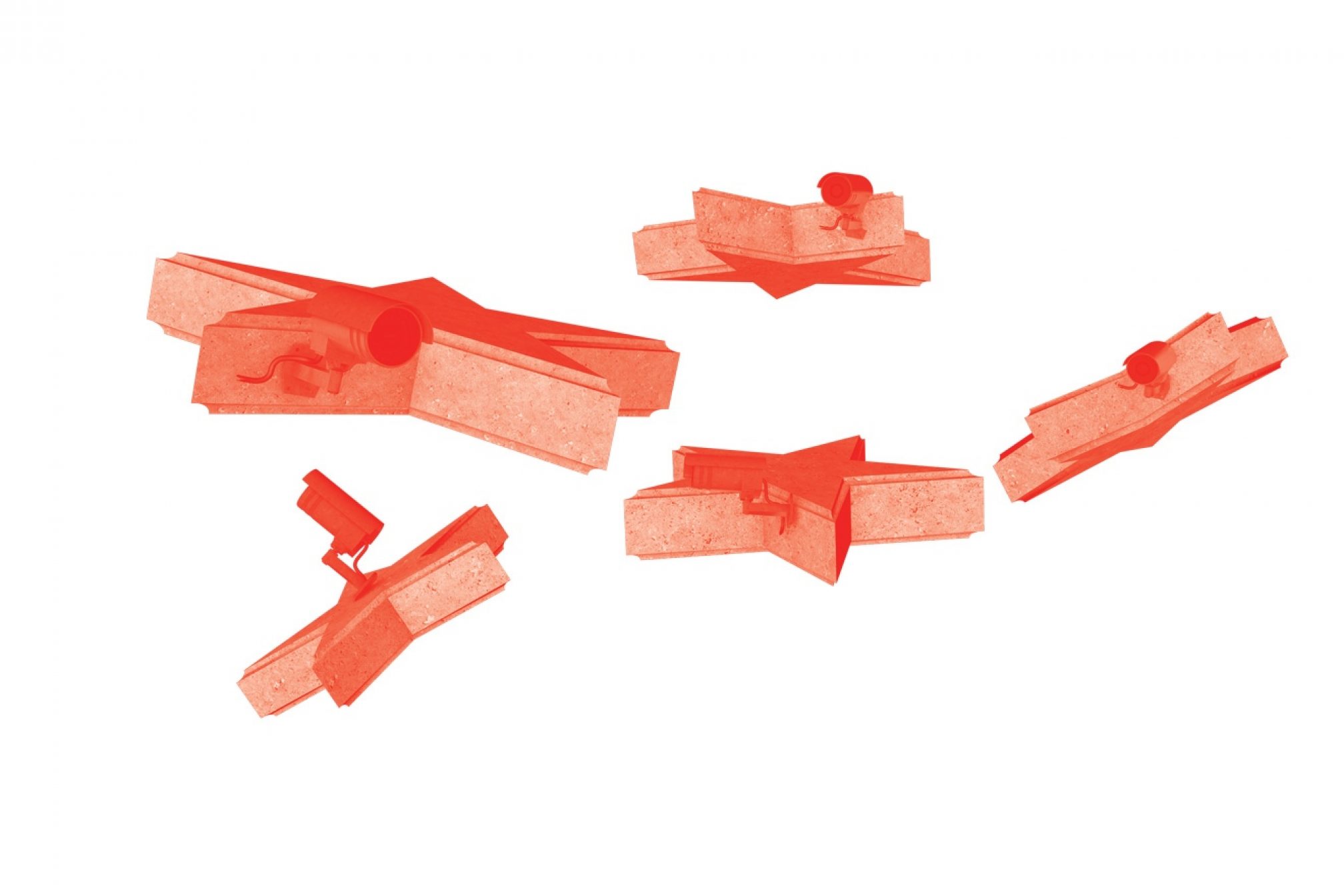 Features
Features
Can China’s underground club culture survive the country’s rise in state surveillance and control?
Increased surveillance in China has some people worried about the future
It’s 2am on a crisp morning in February 2016 and a techno army are packed into a tunnel behind IKEA in the Nanshan District of Shenzhen in south-eastern China. The crowd is a mix of internationals and locals – but they share the camaraderie and exhilaration that comes with being part of a small, intense scene. Hong Kong DJ Frankie Lam is neck-deep in a pounding techno set. Then the music cuts out. Something’s wrong. Bright lights blind the crowd. A surge forward. Screams, confusion. Panic grips. “Run!” someone shouts. But the exit is blocked.
Chinese security officers in riot gear have stormed the rave. As each person tries to escape they’re grabbed and marched to one side of the tunnel. Ravers from China, UK, USA, South Korea, Canada are pushed to the floor, face-down like prisoners of war. It’s only when they’re shoved onto a waiting bus that they realise what is happening. They’re being taken away for drug testing.
Three years later and China’s club scene is – on the surface at least – booming. Glossy superclubs are open every night of the week, all year round, from Beijing to Guangzhou. “Before, people liked to go to karaoke,” says Don, editor of Mixmag China. “However, for the last five or ten years people have wanted to go clubbing – so the scene is growing fast.”
China’s youth love EDM, and the big clubs are big business. “Clubs spend money on a licence and the people inside pay for VIP tables. In China they don’t sell Champagne by the bottle; they sell it by the case.”
But these Champagne VIP super-clubs still don’t represent the entirety of the Chinese club scene. Tucked away in the nooks of Shanghai, the corners of Beijing and the alleyways of Chengdu are clubs that champion community over Cognac and talent over table service.
Clubs and parties like .TAG, Elevator, ALL, Celia, Arkham, Dada are home to a powerful scene. The owners, DJs and promoters get little monetary compensation for their efforts. Instead they’re rewarded by witnessing homegrown talent flourish through monthly residencies. They feel proud to host China’s first LGBTQ+ parties and to watch their communities become families (a group of local clubbers recently got joint tattoos of the .TAG logo on various body parts).
‘Deena’, for example, is a 22-year-old DJ from Beijing who’s heavily involved in this underground scene. She has a short, pixie hair cut and wears thick silver chains as earrings, dark lipstick and thick black eyeliner. Her selection ranges from drum ’n’ bass to techno to house to glitch-hop. Deena has played in underground clubs in most major cities in China, and says that with support from the community and the underground clubs, more and more locals are progressing from the dance floor to the decks. “There used to be about two female DJs, to my knowledge, in Beijing, but now there are about twenty to thirty. The number is slowly increasing, which is a good thing – we’re so happy to receive this new culture and try to grow it.”
In parallel with this rise, though, scenes like the raid in Shenzhen have become more commonplace, and surveillance, control and a crackdown on ‘subversion’ in general in China over the past six months has some worried about the future.
‘Brian’ is a science professor from New Zealand. He’s lived in Shanghai for four years and attends club nights and parties at least three times a week. He speaks slowly and with caution, picking his words carefully, but his love for the scene and affection for his adopted country is evident. He mentions what sounds like an ironic reversal of the Opium Wars of the 19th Century; while many experts claim that China’s factories export recreational chemicals, from Fentanyl to MDMA, by the ton to the West, its underground dance scene is now hardly powered by drugs at all. “Four years ago the risks were high, but you could get your hands on stuff,” he says. “But now everything is gone.”

“I don’t think there’s been some sort of special directive to target club culture; it’s just one aspect of this larger trend.” Brian believes this is a consequence of a general rise of authoritarianism in the country. Xi Jinping, President of the Communist Party of China, has in the last two years tightened his grip on absolute power, and correspondingly on surveillance and censorship.
The party wants to maintain control over China’s internal population of over 1 billion souls, and of its external image as an economic superpower. It’s an attitude that sees no distinction between the online world and the physical world: since 2012 China has implemented firewalls, censorship and monitoring to keep tabs on virtual activity. Type a ‘sensitive’ word over leading social media / messaging app WeChat and one of the 2 million people employed to monitor online content will flag you. They’ll know your weekend plans, what club night you’re going to – and they have the right to drug test.
“Most [expat] people I know are extremely cautious because they want to stay in China,” says Brian. “For foreigners here it’s typically one strike and you’re immediately out. I’ve heard stories of people being taken immediately to the airport and put on a plane; not even given the opportunity to go back home and get their belongings.”
In the last two years it has become increasingly common for clubs to be raided mid-set. The lights will come on, the music shut down and each person will be rounded up and taken away for drug tests, either by hair or urine sample. An American caught up in the Shenzhen tunnel rave says “They made sure it was my pee by literally looking at me do it.”
For a foreigner, testing positive for drugs can mean immediate deportation; for locals it means a short spell in prison – the UK Foreign Office website warns that tourist can be random drug-tested at any time, and prosecuted for testing positive whether in possession of drugs or not. “For Chinese citizens, once they test positive for something their life becomes much worse,” Brian explains. “They get periodically, randomly tested; police just show up at their door to re-test them. If they want to travel around domestically within China they’ll get drug tested in the airports. So it makes moving around really difficult.”
It’s been a highly effective dry run for a new initiative to give each Chinese citizen a ‘social ranking score’ based on their behaviour and able to affect everything from their freedom to travel to their energy bills and internet speeds.
Kyle is the founder of one of Shanghai’s most respected underground clubs. He speaks with an English accent in measured, thoughtful sentences. “It’s still a small scene and culture, so the people who are into it are really into it,” he says. “They’re not doing it because it’s cool, or because their older brother likes it. Cities that have had scenes built up for a while don’t get that energy – that togetherness.” This club opened its doors a few years ago, after Kyle and his friends threw a series of successful parties together. Kyle fondly remembers how competing club owners in Shanghai congratulated, him and immediately offered support and advice. “In other cities you might look over your shoulder, protect things,” he says. But for this scene it’s all hands on deck.
But the ‘hostile environment’ of raids and regulation is taking its toll. “It’s definitely having an impact,” Kyle confirms. “I guess for the most part it’s changing peoples’ habits. A lot of countries have been through changes like this - Korea. Singapore. People just adjust how they go out.”
In his 2002 essay, Harvard University’s Perry Link described China’s approach to censorship as “Not so much a man-eating tiger or fire-snorting dragon as a giant anaconda coiled in an overhead chandelier. Normally the great snake doesn’t move. It doesn’t have to. It feels no need to be clear about its prohibitions. Its constant silent message is ‘You yourself decide’, after which, more often than not, everyone in its shadow makes his or her large and small adjustments.” By punishing enough people and raiding enough clubs, authorities have changed the shape of the underground scene – but, demonstrating that there’s much more to underground clubbing than drug use, the scene perseveres.

In fact, Brian seems almost light-hearted about it. “It’s funny, because this stuff is normalised. I’ve been here for a while. But I guess it is pretty wild…” He pauses for a moment. “I have a friend who managed to escape out of the back door during one of these raids. He immediately got on a plane the next day and went and hung out in Vietnam for a month.”
The key question, of course, is whether the authorities are simply enforcing drug laws zealously or using them as an excuse to crack down on an alternative scene. The risks and restrictions don’t seem to slow Brian and his friends down when it comes to going out; if anything, it’s tightened their community, inspiring them to keep going. “It gives us something to talk about,” Brian laughs. “Like the weather.”
The impact Kyle speaks of is mainly emotional. Many of his friends have been caught up in raids. Constantly changing or unevenly applied regulations mean clubs can have a tenuous grip on their home venues. The scene is small, and everyone knows each other, even in different cities – so when clubs are raided and people charged it emotionally impacts an entire friendship group. People put their whole lives into building club culture and safe environments in cities like Shenzhen and Chengdu, and the emotional impact of being shut down is huge. Deena’s favourite club, The Shelter, shut in 2016 when its application was rejected. She says, “I felt sad that day because I didn’t know where to go.”
But Deena, Brian and Kyle all maintain that the scene remains extremely vibrant, tight and strong. Their spirits remain high and, despite the fact that the stress and the emotional toll of being raided and seeing friends being affected, they still throw world-class parties.
Kyle says, “There’s the mental challenge of not knowing how things will change in terms of regulations. But most of the challenge for us is just trying to make a business work that’s still niche in a city of twenty-five million people.”
He explains that changes in legislation usually start from Beijing, the centre of Chinese government. “So when these things happen in other cities, people in Beijing laugh and say, ‘Welcome to my life’.” There it is again – that undeniable sense of humour. Kyle says: “On a direct personal level, it sucks. But it’s one of those things: if you don’t develop a sense of humour about it, it’s probably going to kill you.”
Another complication is The Great Firewall. DJs in China have limited access to music, with SoundCloud and YouTube blocked by the government. Although most people have a VPN, it makes music difficult to share with listeners outside China.
Xin is an Amsterdam-based DJ from China and a founding member of a popular party series and DJ collective in the Netherlands, and describes a situation back home that’s almost reminiscent of the pre-digital DJ era. “In China we find music through word of mouth – someone plays a tune and they share the artist using VPNs. The hardest part is for them to get heard by the world. They can’t share their music easily. It’s just shared in China’s inner circle.” Most weekends you’ll find Xin behind the decks at one of Amsterdam’s underground institutions, causing clubbers to dance like crazy to punchy house and breakbeat-fused techno, all the while wearing a T-shirt that boasts ‘Made In China’. Xin is still closely connected to his home scene and believes that China needs it now more than ever. “We have different social standards in China,” he says. “Everything is about being accepted by the masses: to be and act a certain way. [But] the underground scene is showing people that there’s an alternative. You don’t need to be the same as everyone. We have fun in a different way. We have an identity outside of owning property or having money. Maybe I can’t afford a property but I can dance better than you.”
And, with most cities topping 20 million people, and rising economic inequality in the country, finding a place to belong is vital. “In China people are craving community,” Xin says. “Usually when they go out people pay, have fun and then leave. There’s no connection. But with electronic music the same group of people come to the same party, come out, become friends, become family. Even if the scene is really small now, it’s just the beginning.”
It’s a worthwhile goal, and one as old as rave culture; whether it’s compatible with the country’s vast, unprecedented social engineering project is the question. In the meantime, China’s underground clubbers dance on. And above them, the anaconda watches.
Some names have been changed



